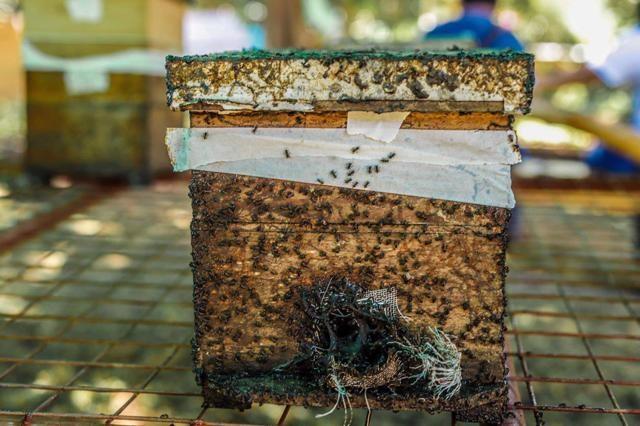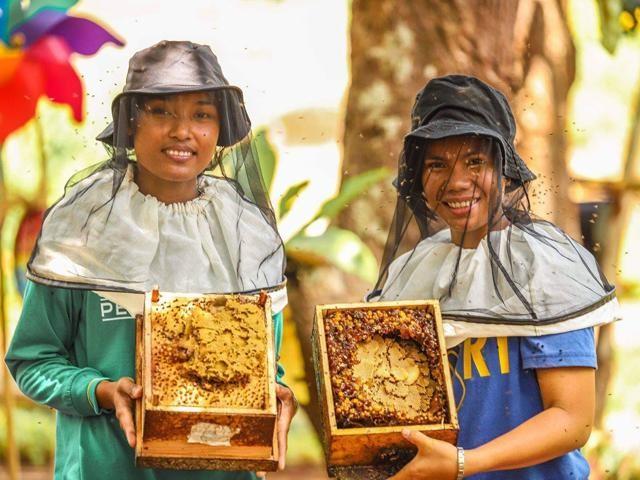Tourism farm opens bee project to restore Yolanda's toll on pollinators
Newly accredited agro-tourism destination Yamang Bukid Farm in Palawan has taken steps to restore Puerto Princesa’s biodiversity super Typhoon Yolanda had dealt a huge toll on, as it cut a swathe of destruction across central Philippines six years ago.
Nature's greatest pollinators —bees —were among most badly hit by the killer typhoon that had left thousands of people dead, and over four million homeless in 2013, which also resulted in low farm productivity in several typhoon-hit areas.
Enlisting the help of bee experts from University of the Philippines-Los Baños (UPLB), the Yamang Bukid Farm has taken efforts to propagate native, stingless bees —locally known as kiyot or kiwot —to help restore the pollinators’ population to normal levels.

The National Center of Excellence for Bee Research and Development at UPLB, headed by award-winning bee scientist Professor Emeritus Dr. Cleofe R. Cervancia, introduced the bee program at the Yamang Bukid Farm.
Commenting on the destruction wrought by Typhoon Yolanda, Dr. Cevancia said, “Sa agriculture, sabihin na nating nandiyan na lahat ng kailangan mo: nandiyan ang magagandang binhi, tamang pamamaraan ng pagpapatubo ng halaman pero kung wala kang pollinators, wala tayong maaani na mga prutas at mga gulay” (In agriculture, we won’t be able to harvest the fruits of our plants and vegetables without the pollinators, even if we have the resources such as seeds and technologies).
WATCH: Dr. Cleofe Cervancia explains the bee program for the YB Farm.
Dr. Cervancia envisions the restoration of the pollinators’ population to desired levels to help the country recover from vegetation loss due to Yolanda.
She said the YB Farm is suitable for bee farming as it has plants and wild flowers that attract pollinators.
“Nakita natin na nadiyan [sa Yamang Bukid Farm] ‘yong bee plants. Makikita natin ang diversity. Hindi lang nag-focus ang farm sa mga gulay, meron ding wild flowers that are very good at conserving our pollinators” (Diversity at the YB Farm is suitable for bee framing as it has a wide variety of plants, vegetables, fruit trees, wild flowers, among others that are very good for the propagation of pollinators), Dr. Cervancia said.
Her team had taught YB agriculturists and farmers exemplary practices on beekeeping, managing colonies, and processing of stingless bee byproducts. YB farmers are focused on native species propagation.
Bee-nefits of Kiyot

Kiyot are great pollinators of fruit trees and high-value crops such as mangoes, rambutan, lansones, and other varieties of vegetables and wild flowers.
“Kailangan talaga ng farm ‘yong pollinators ...to be specific, ang kiyot mas maganda na sila ‘yong nasa farm kasi sila ang pinaka-effective pollinators lalo na sa fruit trees and vegetables. Dahil sa size nila, kaya nilang pasukin kahit maliliit na bulaklak which is naging advantage nila ‘yon,” (The farm needs kiyot as pollinators to produce more harvest and grow more flowers. Kiyot’s tiny size is an advantage as they can penetrate even small flowers to pollinate), said Liza Jean Yocte, one of the agriculturists of the YB farm.
Aside from pollinating, kiyot is beneficial to humans as it produces honey and other byproducts, such as beeswax that can also be used in making soap, lip balms, toothpaste, insect repellents, among other personal care products.
Propolis is also produced by the kiyot, which has a higher clinical value compared to honeybees —it has an antibacterial and anti-fungal properties. It is also an antioxidant that is good for cancer patients.
Beekeeping of kiyot is easy, said Marilyn Cenit, one of the agriculturists of Yamang Bukid Farm.
“Hindi po siya matrabaho. Nakakatuwa ‘yong nakikita mong mabilis ang production nila ng honey at active talaga sila. Para bang nakikipagtulungan sila na maging successful ang project. Marami na po kaming naharvest [pulot],” (Beekeeping stingless bees is easy to manage. Kiyot actively produces honey and other byproducts. It seems like these bees cooperate with us to make this project successful as we already harvested a lot).
“Hahayaan mo lang sila. Monitor lang kasi hindi sila kasing maselan at alagain gaya ng honeybees,” (You will just let the bees do the work. You will just monitor their activities as they are not delicate like honeybees), she added.
Also, the beekeeping project at the Yamang Bukid Farm has become an added attraction to tourists, triggering dialog and discussion between visiting tourists and beekeepers, raising awareness and appreciation of the country’s native bees. —LBG, GMA News




